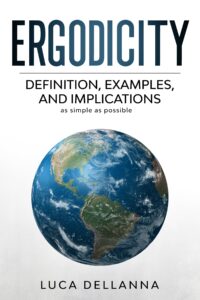Luca's monthly newsletter, on IQ, ethics, solving the right problem, and much more.
Hi! Here you are with a new edition of the newsletter. I’m trying to keep them shorter and increase their frequency. Let’s see how it goes.
Errata: in the previous edition of the newsletter, I included the wrong link to my ergodicity video, apologies. Here is the correct one: link.
On traditions
“Traditions are a set of solutions to problems we’ve forgotten we ever had” (link; original quoted adapted, I guess, from Donald Kingsbury.)
On the same topic, a few years ago, I wrote, “Instincts are the genetic memory of the problems our ancestors faced.”
In general, it is worth asking ourselves: are our instincts a form of Chesterton Fence? (see below)
There exists in such a case a certain institution or law; let us say, for the sake of simplicity, a fence or gate erected across a road. The more modern type of reformer goes gaily up to it and says, “I don’t see the use of this; let us clear it away.” To which the more intelligent type of reformer will do well to answer: “If you don’t see the use of it, I certainly won’t let you clear it away. Go away and think. Then, when you can come back and tell me that you do see the use of it, I may allow you to destroy it.” – G. K. Chesterton
David Boxenhorn’s 3 laws of politics
David wrote a great article on how people can be Mundian or Modian. Mundians believe that the world is made of immutable laws and that those who learn them can manipulate the world. Conversely, Modians believe that the world is made of relationships between people and that people can successfully manipulate the world by figuring out who is powerful, or by becoming powerful themselves.
In a more recent tweet, David wrote the following three laws.
- Everyone is Mundian about things they actually know.
- Any organization will eventually become Modian, whatever its explicit objective.
- The simplest way to explain the behavior of any bureaucratic organization is to assume that it is controlled by Modians.
I like the three laws and believe that they are indeed very useful to describe the world.
It’s interesting to read them with censorship in mind. I would summarize my problems with censorship as “censorship makes sense in a Mundian environment but is suicidally dangerous in a Modian one” because of Law #2. Law #3 is a great argument against censorship too.
Organizational culture
Mark Brooks: “There are five ways to kill your culture: 1) break promises, 2) promote undeserving people, 3) incentivize cutthroat behavior, 4) bog down performers with process, 5) dismiss constructive feedback.”
I agree with all five points. It’s hard enough to create a good organizational culture that managers should avoid at all costs what kills it. And yet, most organizations approach culture with one foot on the accelerator and one on the break (the five points above). The result is a big burnout and not much distance traveled.
In a related note, I’ll soon hold a free online talk on fostering Core Values in a company (links at the bottom of this email).
Improvements
“If you don’t appreciate what you have you won’t appreciate what you get.” – Joe Norman (link)
Awareness of root problems is one of the most important skills one can get.
My heuristic: if a problem recurs, you didn’t understand its root. As with all heuristics, it’s not always true, but we’re better off assuming it is and acting accordingly.
Adaptation
“Clear thinkers take feedback from reality, not society.” – Naval Ravikant
In my interpretation, the quote above is not about a sociopathic neglect of people. Rather, it’s the realization that often, people don’t say what they feel and don’t act as they say. Therefore, a maker doesn’t ask people what they think about his product but puts it in front of them and observes what they do.
It’s also the realization that, if something seems a good idea, but in reality proves terrible, it was a terrible idea. Hence the need to get feedback from reality as early as possible, so that one can iterate rather than proceeding on the wrong path until it’s too late.
(By the way, I have a course on feedback, adaptation, and antifragility – the next edition starts in May, link.)
On vibrations
This short video. As Ben Hunt commented, social systems work similarly in many ways.
Events & talks
On Saturday the 24th of April, I’ll hold a free talk on The Distributed Brain Framework (registration link).
On the following week, I’ll hold another free call on Getting Core Values Adopted. There are two registration links, for I will repeat the call to accommodate for two different time preferences:
- this one for Tuesday the 27th of April at 2pm CET / 5.30pm IN / 8pm SG, and
- this one for Wednesday the 28th of April at 7pm CET / 1pm EST / 10am PST.
In both cases, places are limited and registration is free but mandatory.
(You can read the Roam version of this newsletter here: link)








